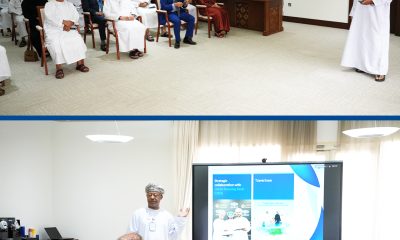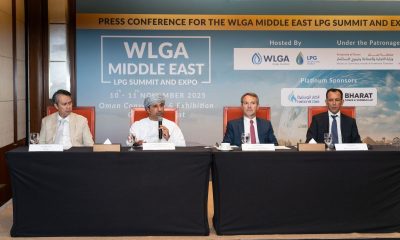Economy
Oman’s Mining Sector: Catalyst for Economic Diversification

Oman’s mining and quarrying sector grew by 16.4 per cent during the last year. Mining projects and initiatives with a value of over $2bn have been identified for private sector investment in the Sultanate
The government of Omani’s Vision 2040 identifies mining as one of the focus sectors for enhancing competitiveness and growth, promising much potential for this developing industry. The strategy, along with recent discoveries of substantial amounts of mineral deposits and the large-scale projects underway in Oman offers numerous opportunities for investment in mineral development, mining and quarrying exploration and operations.
The mining and quarrying sector in Oman grew by 16.4 per cent in 2017.
According to the Public Authority for Mining (PAM) – the regulatory authority and nodal agency for the mining industry in the Sultanate, mining projects and initiatives with an investment value of over $2bn have been identified for implementation by the private sector. The investment opportunities are linked to, among other things, the mining of gypsum, limestone, gabbro and aggregates, kaolin and silica quartz. It also includes an array of business opportunities at the upstream and downstream ends of initiatives centring on the mining and production of copper, chromium and ferrochrome commodities.
PAM organised a six-week long mining lab in 2018 to deliberate on strategies for accelerating investment in the mining sector in the Sultanate. The lab came up with more than 43 initiatives and projects, with a value estimated at RO813mn, 99 per cent of which will be shouldered by the private sector.
These initiatives and projects are expected to increase the contribution of the mining sector to the GDP by three times the current contribution, to reach an estimated value of around RO378mn by 2023. Besides, it will create no less than 1600 direct job opportunities for Omanis and raise the mining production of the Sultanate from 100 million tonnes in 2016 to 147 million tonnes by 2023.
High-level officials from as many as 40 government, public and private sector organisations took part in the mining lab, which was held to brainstorm strategies and plans for unlocking the potential of the mining industry and thereby enabling its contribution to economic diversification and GDP growth.
Mining Law
Oman’s newly enacted Law of Mineral Wealth which came into effect on March 14, 2019, strengthens the role of the Public Authority for Mining (PAM) in harnessing the potential of the country’s abundant mineral resources in supporting the national economy.
Eng Hilal bin Mohammed al Busaidi, CEO of the authority, said that the law was based on the results of a comprehensive assessment study on the mineral sector and was guided by a number of relevant national and regional legislations and regulations.
The PAM has ensured that the law included incentives for developing the mineral sector, boosting its investment appeal, and facilitating and expediting the procedures for obtaining mining approvals. Al Busaidi mentioned that the law would help address challenges facing the sector. It includes a number of provisions designed to safeguard Oman’s mineral wealth while supporting its prudent and sustainable exploitation in advancing economic development.
Under the new law, the PAM will offer mining concessions through public tenders based on “competition, merit and fair play,” he said. It stipulates that all mineral resources, quarry materials and other related mineral wealth within Omani territorial limits, encompassing even exclusive economic zones and continental shelf areas, are the property of the state, which shall be safeguarded. Ownership, possession, exploitation and disposal of this wealth shall be governed by the provisions of the new law.
According to Ziyad bin Ali al Balushi, director of the legal affairs department, the new law effectively introduces a new methodology governing the licensing of mining areas. “We are currently preparing the procedures and regulations for the tendering and award of mining concessions, as well as guidelines designed to encourage investment in downstream and value-added processing industries,” he said.
PAM is also working at an accelerated pace to prepare the executive regulations in support of the new Mining Law, the official said. The executive regulations will set out the rights and obligations of the investors, developers and other stakeholders that are party to any concession. The regulations will also spell out the tenures of concession agreements, royalties and other levies payable, and developmental commitments to the local community.
“While the law features many provisions to encourage investment in the sector, it also stipulates penalties for actions detrimental to the sound commercialisation of Oman’s mineral wealth,” Al Balushi added. For example, those found engaging in mining activities without a valid license are liable to prison terms ranging from 1 to 3 years, in addition to fines extending from RO20,000 to RO100,000. It stipulates that all mineral resources, quarry materials and other related mineral wealth within Omani territorial limits, encompassing even Exclusive Economic Zone (EEZ) and continental shelf areas, are the property of the state, which shall be safeguarded, and only lawfully exploited for economic development. Ownership, possession, exploitation and disposal of this wealth shall be governed by the provisions of the new law, he added.
Duqm rich in minerals
The Special Economic Zone in Duqm (SEZD) is rich in many minerals, including limestone, which has a purity of calcium carbonate between 85 per cent and 98 per cent. Limestone is used in many industries, such as dyes, cement clinker poultry feed, fertilizers, pharmaceuticals, cleaning preparations, glass, plastics, and many other industries. The dolomite stone is also found in abundance in Duqm, and the percentage of magnesium found in it is between 14 per cent and 24 per cent. The dolomite enters many industries, notably iron and its derivatives.
In December 2018, Duqm Quarries Company announced the completion of the mining map for the Special Economic Zone in Duqm (SEZD). Eng Ali bin Abdullah Al Zidjali, general manager of the company, said that the map determined the types of minerals in Duqm, their locations, their quantities and their quality. He pointed out that the map was interactive.
The mining map was aimed at identifying the types and quality of minerals in Duqm and thus marketing them professionally to achieve the objectives of the company in attracting international companies to invest in this vital sector. Such investment will be in the form of establishment of factories in SEZD to increase the value of available minerals rather than exporting them abroad. He stressed that the company did not have any directions for the export of raw materials outside the Sultanate, but would focus on their exploitation in the Sultanate.
He said that the mining map would be marketed locally and internationally in order to attract local and international companies to invest in this vital sector.
Duqm Quarries Company was founded in 2017 with the aim of managing and operating the quarrying and mining sector in SEZD. Tatweer, owned by the Special Economic Zone Authority in Duqm (Sezad), owns 70 per cent of the shares of Duqm Quarries Company; a number of other companies, notably Duqm Al-Ahliya, owned by the people of Duqm, holds the remaining shares.
The Shomookh Mining Industries Complex in SEZD translates the Sultanate’s vision to exploit local raw materials in establishing industries that raise the economic value of the raw materials available in the country. The complex has succeeded in attracting eight international companies to invest in this complex until mid-December 2018.
Oman mining expo
Oman Mining Expo, organised by sector regulator Public Authority for Mining (PAM) and trade exhibitions and conferences organiser Omanexpo, taps these emerging opportunities by providing an annual international platform to showcase current industrial projects that will attract local and international mining firms to invest in the sultanate. To be held from April 15 to April 17 at the Oman Convention & Exhibition Centre (OCEC), the third edition of Oman’s landmark industry event and the Middle East’s leading mining show, will open its doors to the industry showcasing mining-related exhibits and services from the biggest mining companies in Oman and the region. There will be country pavilions from China, Germany, India, Iran and Turkey.
In keeping with previous editions, the organisers are bringing in a high-level conference focusing on the growth strategies in the sector; new mining laws and regulations; case studies on Saudi Arabia and South Africa’s mining industries; project financing and investment opportunities in Oman; digital and innovative technologies in mining; sustainable development, and other noteworthy topics.
-

 Alamaliktistaad Magazines2 months ago
Alamaliktistaad Magazines2 months agoAlam Al Iktisaad – September 2025 Edition
-

 Magazines2 months ago
Magazines2 months agoOER – September 2025 Issue
-

 News2 months ago
News2 months agoKitchenomiKs Secures Investment of US$3.2M Led by Jasoor Ventures
-

 News2 months ago
News2 months agoOman Inaugurates ‘Hadatha’ – Its All-New Cybersecurity Center
-

 Banking & Finance2 months ago
Banking & Finance2 months agoOman Arab Bank Highlights Its Ongoing Strategic Initiatives and Future Plans
-

 News2 months ago
News2 months agoIEA Expects Global Oil Market to Remain Oversupplied in 2026
-

 Energy2 months ago
Energy2 months agoWLGA Middle East LPG Summit & Expo 2025 to be held at OCEC on November 10 and 11
-

 Real Estate2 months ago
Real Estate2 months agoAl Mouj Muscat Unveils Azura Beach Residences Phase 2: A New Chapter in Waterfront Living































You must be logged in to post a comment Login